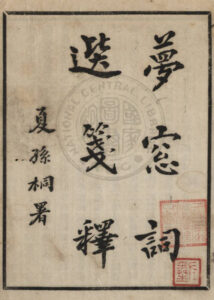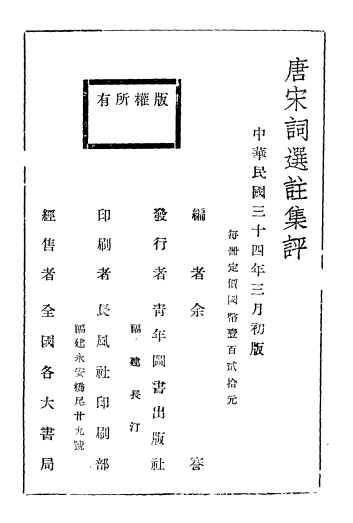This website uses cookies so that we can provide you with the best user experience possible. Cookie information is stored in your browser and performs functions such as recognising you when you return to our website and helping our team to understand which sections of the website you find most interesting and useful.





 In response to these limitations, Dr Gary Tsang, Assistant Professor in the School of Arts and Social Sciences at Hong Kong Metropolitan University, conducted a research project which aims to comprehensively investigate Ci annotations in the first half of the 20th century by utilising scholarly big data — the combination of several digital archives which consist of extensive and diverse information. With the aid of scholarly big data, Dr Tsang discovered that there are about 100 Ci annotations published during the Republican China period, which is a significant growth in quantity compared to only about 30 Ci annotations from Qing dynasty or before. Most of these Ci annotations could be accessed through the internet, thus saving time and costs associated with searching for relevant books that are scattered across different libraries or not even collected by libraries. As a result, Dr Tsang could review the Ci annotations and determine their academic value more efficiently, which helped to identify the areas that lack sufficient research and forming his research directions and strategies.
In response to these limitations, Dr Gary Tsang, Assistant Professor in the School of Arts and Social Sciences at Hong Kong Metropolitan University, conducted a research project which aims to comprehensively investigate Ci annotations in the first half of the 20th century by utilising scholarly big data — the combination of several digital archives which consist of extensive and diverse information. With the aid of scholarly big data, Dr Tsang discovered that there are about 100 Ci annotations published during the Republican China period, which is a significant growth in quantity compared to only about 30 Ci annotations from Qing dynasty or before. Most of these Ci annotations could be accessed through the internet, thus saving time and costs associated with searching for relevant books that are scattered across different libraries or not even collected by libraries. As a result, Dr Tsang could review the Ci annotations and determine their academic value more efficiently, which helped to identify the areas that lack sufficient research and forming his research directions and strategies. Dr Tsang pointed out that some Ci annotations that were rarely discussed or nearly neglected by scholars can be found because of the facilitation of scholarly big data. Researchers are now able to overcome spatial limitations and expand the research scope by comparing different editions of Ci annotations, such differences between editions may reveal the evolution of a Ci poet's scholarly ideas. For instance, with the assistance of scholarly big data, Dr Tsang could find and access the initial edition of Yang Tiefu (楊鐵夫)'s Meng Chuang Ci Xuan Jian Shi (《夢窗詞選箋釋》) and figure out the differences between various versions of this Ci annotation, in order to study the evolution of Yang's literary and poetic thoughts.
Dr Tsang pointed out that some Ci annotations that were rarely discussed or nearly neglected by scholars can be found because of the facilitation of scholarly big data. Researchers are now able to overcome spatial limitations and expand the research scope by comparing different editions of Ci annotations, such differences between editions may reveal the evolution of a Ci poet's scholarly ideas. For instance, with the assistance of scholarly big data, Dr Tsang could find and access the initial edition of Yang Tiefu (楊鐵夫)'s Meng Chuang Ci Xuan Jian Shi (《夢窗詞選箋釋》) and figure out the differences between various versions of this Ci annotation, in order to study the evolution of Yang's literary and poetic thoughts.






